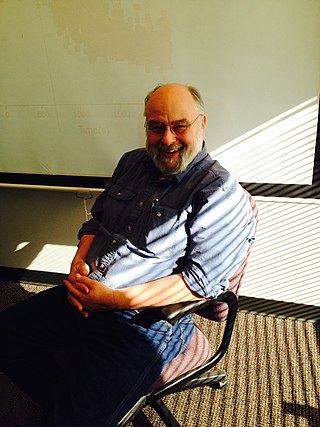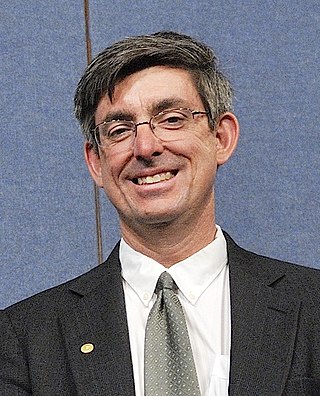Related Research Articles

Daniel Chee Tsui is an American physicist. He is currently serving as the Professor of Electrical Engineering, emeritus, at Princeton University. Tsui's areas of research include electrical properties of thin films and microstructures of semiconductors and solid-state physics.
Christoph Carl Herbert "Chris" Adami is a professor of microbiology and molecular genetics, as well as professor of physics and astronomy, at Michigan State University.

Jonathan P. Dowling was an Irish-American researcher and professor in theoretical physics, known for his work on quantum technology, particularly for exploiting quantum entanglement for applications to quantum metrology, quantum sensing, and quantum imaging.
Raymond Laflamme, OC, FRSC is a Canadian theoretical physicist and founder and until mid 2017, was the director of the Institute for Quantum Computing at the University of Waterloo. He is also a professor in the Department of Physics and Astronomy at the University of Waterloo and an associate faculty member at Perimeter Institute for Theoretical Physics. Laflamme is currently a Canada Research Chair in Quantum Information. In December 2017, he was named as one of the appointees to the Order of Canada.
Girsh Blumberg is an Estonian-American physicist working in the experimental physics fields of condensed matter physics, spectroscopy, nano-optics, and plasmonics. Blumberg is an elected fellow of the American Physical Society (APS), an elected Fellow of the American Association for the Advancement of Science (FAAAS) , and a Distinguished Professor of Physics at Rutgers University.

Duncan G. Steel is an American experimental physicist, researcher and professor in quantum optics in condensed matter physics. He is the Robert J. Hiller Professor of Electrical Engineering, Professor of Physics, Professor of Biophysics, and Research Professor in the Institute of Gerontology at the University of Michigan. Steel is also a Guggenheim Scholar and a Fellow of American Physical Society, the Optical Society of America, and the Institute of Electrical and Electronics Engineers. He coedited the five-volume series on the Encyclopedia of Modern Optics.

Robert J. Schoelkopf III is an American physicist, most noted for his work on quantum computing as one of the inventors of superconducting qubits. Schoelkopf's main research areas are quantum transport, single-electron devices, and charge dynamics in nanostructures. His research utilizes quantum-effect and single-electron devices, both for fundamental physical studies and for applications. Techniques often include high-speed, high-sensitivity measurements performed on nanostructures at low temperatures. Schoelkopf serves as director of the Yale Center for Microelectronic Materials and Structures and as associate director of the Yale Institute for Nanoscience and Quantum Engineering. Since 2014, Schoelkopf is also the Director of the Yale Quantum Institute. He is Professor of Physics and Sterling Professor of Applied Physics at Yale University. The title of Sterling Professor is the highest honor bestowed upon Yale faculty.
Andrea Jo-Wei Liu is the Hepburn Professor of Physics at the University of Pennsylvania, where she holds a joint appointment in the Department of Chemistry. She is a theoretical physicist studying condensed matter physics and biophysics. She is particularly known for her study of jamming, a phenomenon in which disordered materials become rigid with increasing density and stress. She is a Simons Investigator and Simons Fellow in Theoretical Physics, fellow of the American Physical Society (APS), the American Association for the Advancement of Science (AAAS), the American Academy of Arts and Sciences, and a member of the National Academy of Sciences (NAS).
J. C. Séamus Davis is an Irish physicist whose research explores the world of macroscopic quantum physics. Davis concentrates upon the fundamental physics of exotic states of electronic, magnetic, atomic and space-time quantum matter. A specialty is development of innovative instrumentation to allow direct atomic-scale visualization or perception of the quantum many-body phenomena that are characteristic of these states.
Frederick Joseph Gilman is an American physicist and the Buhl Professor of Theoretical Physics Emeritus at Carnegie Mellon University.
Jean-Pierre Leburton is the Gregory E. Stillman Professor of Electrical and Computer Engineering and professor of Physics at the University of Illinois at Urbana–Champaign. He is also a full-time faculty member in the Nanoelectronics and Nanomaterials group of the Beckman Institute for Advanced Science and Technology. He is known for his work on semiconductor theory and simulation, and on nanoscale quantum devices including quantum wires, quantum dots, and quantum wells. He studies and develops nanoscale materials with potential electronic and biological applications.
Nina Marković is a Croatian-American physicist. Her work focuses on quantum transport in low-dimensional systems, superconductivity, nanostructures, and quantum computing. She received a Sloan Research Fellowship in 2004. Marković worked at Delft University of Technology, Harvard University, and Johns Hopkins University before joining the Goucher College Department of Physics and Astronomy in 2015.
Sandra J. Rosenthal is the Jack and Pamela Egan Professor of Chemistry, professor of physics and astronomy, pharmacology, chemical and biomolecular engineering, and materials science at Vanderbilt University. She is a joint faculty member at Oak Ridge National Laboratory in the Materials Science and Technology Division and the director of the Vanderbilt Institute of Nanoscale Science and Engineering.
Nandini Trivedi is an Indian-American physicist and Professor of Physics at Ohio State University. Her research is on the emergence of new states of matter arising from strong interactions between electrons in quantum materials. She was elected a Fellow of the American Association for the Advancement of Science in 2020.
Adam Leibovich is an American theoretical physicist. He is a full professor and the Betty J. and Ralph E. Bailey Dean of the Kenneth P. Dietrich School of Arts and Sciences and the College of General Studies at the University of Pittsburgh. His research is primarily in quantum chromodynamics (QCD) and the application of effective field theory to problems of hadronic physics, particularly particles containing one or more heavy quarks. Leibovich also has worked on gravitational wave physics. He was elected a fellow of the American Physical Society in 2017 and a fellow of the American Association for the Advancement of Science in 2018.

John Louis Sarrao is an American physicist. He was the deputy director for science, technology, and engineering at Los Alamos National Laboratory. As of 2 October 2023, he became the sixth director of SLAC National Accelerator Laboratory

Supriyo Bandyopadhyay is an Indian-born American electrical engineer, academic and researcher. He is Commonwealth Professor of Electrical and Computer Engineering at Virginia Commonwealth University, where he directs the Quantum Device Laboratory.

Jeremy Levy is an American physicist who is a Distinguished Professor of Physics at the University of Pittsburgh.
Clare C. Yu is an American theoretical biophysicist and condensed matter physicist. She is Professor of Physics and Astronomy in the School of Physical Sciences at the University of California, Irvine (UCI). She is a Fellow of the American Physical Society, of the American Academy of Arts and Sciences, and of the American Association for the Advancement of Science. She is also a former Alfred P. Sloan Fellow, and a current Trustee of the Aspen Center for Physics.
Adriana Moreo is an Argentine-American condensed matter physicist whose research involves the computer simulation of superconductors, oxides of transition metals, graphene, and other strongly correlated materials. She is a professor in the Department of Physics & Astronomy at the University of Tennessee and a member of the research staff in the Materials Science and Technology Division of the Oak Ridge National Laboratory.
References
- 1 2 3 "Curriculum Vitae: Jason R. Petta" (PDF). Petta Group. Princeton University. April 2010. Archived from the original (PDF) on July 3, 2010. Retrieved July 3, 2024.
- ↑ Petta, Jason Robert (2003). Effects of spin-orbit coupling on single quantum states in metallic quantum dots. Cornell University. ISBN 978-0-496-34811-4. OCLC 841789369. ProQuest 305336632.
- ↑ "Jason R. Petta". Future of Semiconductors and Beyond. University of Notre Dame . Retrieved July 4, 2024.
- ↑ "Petta, Jason". Fellows Directory. The David and Lucile Packard Foundation . Retrieved July 4, 2024.
- ↑ MacPherson, Kitta (February 5, 2010). "Princeton scientist makes a leap in quantum computing". News. Princeton University . Retrieved July 4, 2024.
- ↑ "Jason Petta, Princeton University". Department of Physics and Astronomy. Dartmouth College. May 25, 2012. Retrieved July 4, 2024.
- ↑ "Jason Petta: A microwave laser for quantum computing". Princeton Innovation. Princeton University. November 12, 2015. Retrieved July 4, 2024.
- ↑ Petta, Jason R. (April 6, 2009). "Electronic refrigeration on the micron scale". Physics . 2: 27. doi:10.1103/Physics.2.27.
- ↑ Office of Communications (February 10, 2019). "Two faculty members named to endowed professorships". News. Princeton University . Retrieved July 4, 2024.
- ↑ "HRL Laboratories and UCLA Researcher Awarded Grant to Advance Quantum Computing". News. HRL Laboratories. January 10, 2024. Retrieved July 3, 2024.
- ↑ "Faculty". UCLA Physics & Astronomy. UCLA . Retrieved July 4, 2024.
- ↑ "Team". CQSE. UCLA . Retrieved July 4, 2024.
- ↑ "About Us". Research & Creative Activities. UCLA . Retrieved July 4, 2024.
- ↑ "Three faculty elected 2019 Fellows of the American Physical Society". Department of Physics. Princeton University. September 20, 2019. Retrieved July 4, 2024.
- ↑ Cohen, Adam D. (November 24, 2020). "AAAS Announces Leading Scientists Elected as 2020 Fellows". News. American Association for the Advancement of Science (AAAS). Retrieved July 4, 2024.
- ↑ "Newcomb Cleveland Prize Recipients". Awards. American Association for the Advancement of Science (AAAS). Retrieved July 4, 2024.